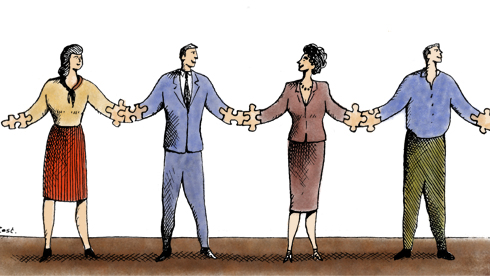If there is a virtue not to be denied Luxembourg's Viviane Reding, it is perseverance. Since this veteran European commissioner took over the portfolio of Justice she has fought a hard campaign to increase the ability of European women to get on the boards of large companies. She is not the only one.
There are many organisations across this continent fighting towards the same goal. The results, as was perhaps expected, have been disappointing, since, even without having completely won other battles, the move poses a direct threat to the halls of power, where there is not a single man graciously willing to offer his seat to a lady. That is why Reding’s initial proposal in March 2011, to invite big corporations to voluntarily take equal opportunities into account, failed.
When it comes to putting women on company boards, quota systems, which in our representative democracies have spread far and wide into other concepts, have the unanimous support neither of countries (as in Germany, which for now prefers self-regulation) nor that of society as a whole. And it also has to be admitted that there are strong arguments against the bill: free enterprise, merit versus gender, legal grounds, etc. It’s also a fact, though, that the discrimination is clear: 86.3 percent of directors are men, on a continent that has long pursued egalitarianism, and where 60 percent of new graduates are women.
Very timid laws
So the opinion that we should sit back with folded arms and wait for half a century to pass before an unfair imbalance is corrected will, in a very short time, be held by a minority in Europe. Eleven of the twenty-seven EU countries have already passed legislation to force change at a somewhat brisker pace. These laws are very recent.
Many have been approved in the past three years. They have been passed in Belgium, Denmark, France – with spectacular results, to be sure – and in Italy, the Netherlands and Slovenia. Spain took the lead, together with the Nordic countries. Very timid laws, they have, nonetheless, succeeded in accelerating the advancement of women into boardrooms, though at a very modest pace (up from 11.8 percent to 13.7 percent).
While bells certainly won’t be rung from the rooftops over this, it is no reason to succumb to melancholy. The EU has real decision-making power only in matters of agriculture, trade and competition. In other areas, advances are made with a great deal of conviction and even more perseverance, with the goal of finally breaking through at the national level and even being written into international treaties.
Watered down
Evidence of that is the battle against climate change and the recent European defeat over the pollution tax to be levied on foreign airlines. When it comes to equality, the resistances are similar, and that could be said of where the resistances come from, too: economic interests, the production system, tradition...
No one knows better than the European Commission what it takes to get women on board. Every five years Brussels implores governments to submit candidates, and yet it has yet to see the number of women on the staff of a College of Commissioners rise above one third. The egalitarian impulse that Zapatero brought into Spanish politics has begun, under Rajoy, to fall off again.
Reding’s new initiative has been watered down in order to gain wider acceptance, but its most unreal proposal is to expect it to be temporary and to expire in 2028. I doubt that by then, and with standards set so leniently both at the European and national level, such blatant discrimination will be a thing of the past.
Was this article useful? If so we are delighted!
It is freely available because we believe that the right to free and independent information is essential for democracy. But this right is not guaranteed forever, and independence comes at a cost. We need your support in order to continue publishing independent, multilingual news for all Europeans.
Discover our subscription offers and their exclusive benefits and become a member of our community now!












